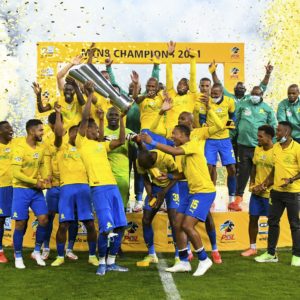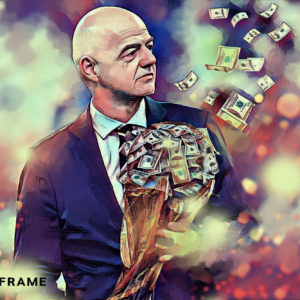A crisis of leadership in South African football
The Premier Soccer League keeps on stumbling from one blunder to the next. And while its leaders can be replaced, the question is whether the damage they are causing can be fixed.
Author:
17 December 2021

South African football’s journey, from being run from the back of car boots to fancy boardrooms as a multimillion-rand industry, is inspirational. Football was true Black economic empowerment long before the term became a thing, offering people hope and an escape during a dark period in the country’s history.
“The multimillion-rand soccer industry has for many years been one of only two sectors – the other being the township taxi industry – where Blacks were largely masters of their own destiny and could make fortunes as club owners,” veteran sport journalist Joe Latakgomo writes in Mzansi Magic: Struggle, Betrayal & Glory – The Story of South African Soccer.
The story of David Thidiela, Black Leopards’ boss, embodies this. Thidiela went from working as a security guard at the Premier Soccer League (PSL) to owning a club that campaigned at the highest level of South African football. He even sat on the executive committee, the league’s highest decision-making body.
Related article:
Football is more than just a sport in South Africa, it’s a religious experience. Most of this power comes from what it stood for during apartheid, when it took on the oppressive regime that divided people according to their race. Football was multiracial way before this was legal, and stadiums offered convenient meeting points for rallies when the apartheid regime banned political gatherings.
But in as much as the game stood up against apartheid, it didn’t mind doing business with institutions that supported and propped up the regime: from BP to Absa, Rothmans and DStv, which was part of the Naspers group that formed the mouthpiece of the Nats, the ruling National Party. While football the social movement has always had a moral compass, football the business has always put money first – regardless of where it came from or the motive behind giving it.
That hasn’t always been bad. Footballers no longer die as paupers because they earn peanuts during their professional days. Some become millionaires who not only change their own lives, but also those of the people around them. There are also families who aren’t directly part of the sport who have been able to put food on the table thanks to football, including the owners and staff of taverns that show the beautiful game, those in hospitality and transport, and the men and women who sell food at the stadium.
Bitter fruits
But doing business with the “devil” finally catches up with you. This year and the last have rudely exposed that. Because of money, some of it from unscrupulous people, the PSL has gone from one crisis to the next without offering the solid leadership that turned football professional and gave Black people an avenue to be masters of their own destiny when they were regarded as nothing more than the help.
The high turnover of statuses being sold isn’t a sign of an industry many are lining up to join, but rather one that’s burning pockets so much that many are running away from something they care about. Many club owners use their family money to run these clubs without much of a decent return, forcing them to quit. In their place are greedy opportunists who aren’t in the sport because of passion, but because they want a vanity project.
Shauwn Mkhize and Lawrence Mulaudzi spring to mind. The two have dragged the reputation of the league through the mud. Mkhize crowned her team champions of the GladAfrica Championship even though there was a ruling that essentially gave Sekhukhune United the title. Her Royal AM refused to honour their play-off matches and took the league through several litigations.
Related article:
She eventually bought her way through the premier division by acquiring the status of Bloemfontein Celtic. Instead of punishing her for bringing the league into disrepute, it handed her a laughable sanction – having to pay only R1.2 million of the R4 million fine the club was handed and suspending the 12 points the team were supposed to be docked – for such a serious crime. The club was also slapped on the wrist for paying players bonuses on the field after a game while streaming the spectacle on its Instagram account.
Mulaudzi caused one embarrassment after another. After buying Bidvest Wits’ status, his Tshakhuma Tsha Madzivhandila couldn’t register players in time for their first few fixtures, struggled to pay players and ended up selling its status before even finishing one season in the elite league. Mulaudzi also failed to pay players when the team were in the first division, but the PSL still authorised his purchase. Even after this poor showing, the league saw nothing wrong when he resurfaced to purchase a first division status.
These two owners exposed two shortcomings of the league: not doing due diligence in screening the people who purchase statuses, and not dealing effectively with transgressions. Mkhize crowned her team champions because the league had dragged its feet in authorising a sanction that was meted out long before the last two rounds of the first division.
Fudging issues further
Instead of learning from these incidents, the league took a further dive with its failure to communicate and act swiftly when Kaizer Chiefs asked to have their games postponed because of a Covid-19 outbreak. The PSL’s rules state that Covid-19 isn’t a strong enough reason to grant a postponement. Cape Umoya United were refused one and charged with bringing the league into disrepute for failing to honour a fixture owing to Covid-19. The precedent set then meant the PSL ought to have done the same with Amakhosi, regardless of how harsh it might sound. Similarly, it didn’t communicate clearly on the return of fans to stadiums, despite the government allowing it.
The PSL’s failure to act, let alone give clarity on the matter (with Cape Town City and Golden Arrows going to matches they knew well their opponents wouldn’t attend) was embarrassing and smacked of unprofessionalism at best. It also hinted at preferential treatment as City and Arrows are yet to be officially given the three points they should get for their walkover.
Related article:
The video of security guards manhandling TS Galaxy chairperson Tim Sukazi and refusing him access to the change room at Orlando Stadium despite having accreditation that allows him comprehensive access is another embarrassing moment. Reports that Orlando Pirates’ media officer, Thandi Merafe, assaulted her TS Galaxy counterpart, Minenhle Mkhize, during that scuffle are worrying. True to form, the league has said nothing on the matter except that it is “awaiting reports”.
It will be interesting to see how the PSL deals with all these issues legally as its prosecutor, Nande Becker, has resigned. Its head of legal, Michael Murphy, has reportedly done the same following the spate of embarrassing incidents.
A new broom needed
The PSL is in a crisis. And we are in this situation because of its poor leadership and failure to promptly act on transgressions that bring the league into disrepute. The leadership is made up of people who played an integral part in the huge strides South African football made in the 1990s. But maybe it’s time they passed the baton after leading for close to three decades.
Instead of calling a press conference and taking the public into their confidence, the league and its main sponsor, DStv, announced a new tournament where fans will choose players from the four streams into which teams are divided. Even though fans will be in “charge” of the DStv Compact Cup, they still won’t attend that tournament. PSL chairperson Irvin Khoza laboured to explain why. The crux of his explanation was that because of contractual obligations to sponsors on the number of tickets the league must give them per game, having 2 000 fans at a match isn’t feasible. So, in short, supporters’ interests don’t trump sponsors’, but when there’s money to be made from the fans, whether it’s from this competition or selling decoders, then they are important stakeholders.
The problem is South African fans don’t speak with one powerful and united voice. To bring change, they have to fix that. The death of the European Super League is an example of the power of supporters. If supporters want change, they must use their financial power to hit the league where it hurts. It will act swiftly then.
Related article:
The direction South African football is taking is worrying. The limited games on the public broadcaster will already cause irreversible damage as there are young children who are growing up without the PSL as part of their staple sport diet. These recent embarrassments could push the league to a point where it becomes a non-entity, like domestic cricket.
Historian Peter Alegi writes in Laduma! Soccer, Politics and Society in South Africa that football “can rightfully claim to have had a major hand in the social liberation of South Africa’s people”. He adds that “football was a shared cultural medium through which people involved in formal and informal social groups connected across racial, economic, ethnolinguistic and political lines”.
If things don’t change, future generations will not be able to agree with these words because the beautiful game would have lost its meaning and its power.




